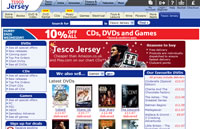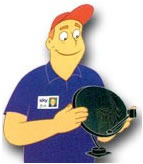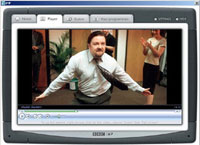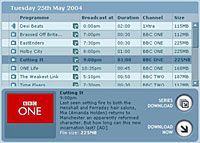 Following the BBC confirmation of High Definition Television (HD) trials for 2006, all of a sudden it feels like there’s a plethora of High Definition services and trials in the UK next year.
Following the BBC confirmation of High Definition Television (HD) trials for 2006, all of a sudden it feels like there’s a plethora of High Definition services and trials in the UK next year.
At an event held in London earlier in the week, under the auspices of the Royal Television Society, Pat Younge from Discovery USA provided news of his experiences. The bad news for commercial UK broadcasters is it costs more; doesn’t bring any extra revenue from advertisers; and it doesn’t increase viewing hours … but if you don’t have it, viewers will seek it out and they’ll end up watching you competitors.
The BBC is, as usual, unwilling to be left behind in new developments. With the expectation of World Cup Soccer in High Def on D-Sat (Digital Satellite) next year, the UK commercial broadcasters, ITV; Channel Four; and Five need to be on HD, but will try and ride on the BBC’s coat tails.
 Speaking at the same event, Richard Freudenstein, CEO, BSkyB, was careful not to mention what the monthly subscription will be for HD on Sky when it launches. He spent his time talking up the platforms’ HD bouquet that will include Sky One, sports and movies with an HD Sky Plus box and plenty of storage capacity.
Speaking at the same event, Richard Freudenstein, CEO, BSkyB, was careful not to mention what the monthly subscription will be for HD on Sky when it launches. He spent his time talking up the platforms’ HD bouquet that will include Sky One, sports and movies with an HD Sky Plus box and plenty of storage capacity.
DTT (Digital Terrestrial TV) in France (quaintly abbreviated in French as ‘TNT’) will be MPEG 4 capable and is HD-ready from go, but finding capacity on the MPEG 2 Freeview platform in the UK is going to be more of a challenge. The BBC’s Jana Bennett, Director of Television is tasked with making the UK trials a success and wants to see the offering across all platforms. She hopes that, as well as cable and satellite, broadband will be a route into the home.
 Confusion still reigns
Confusion still reigns
Although the industry know they must go to HD, it’s clear that they’re far from having a strong hold over it. From listen to the snippets of conversation in the halls before and after the main event, it’s clear that there also remains broadcast industry confusion over the strengths of the various picture standards. This was given away with phrases like “I think 1080 refers to the number of lines” coming from the lips of one ‘expert.’
The equipment people have to buy for their homes is still an area of confusion, not helped by the next-gen DVD industry not agreeing their standard (Blu-ray, HD-DVD).
Once they do and this combines with the widely-predicted, continuing reduction in price, those exciting big displays labeled ‘HD-ready’ will really start to fly off the shelves.
Until then it’s a case of buyer beware – if you can resist the fantastic picture.
 The commercial rivalry between two UK online retailers has spilt over into the world of advertising, or more precisely the heady world of UK advertising adjudication, run by the Advertising Standards Authority.
The commercial rivalry between two UK online retailers has spilt over into the world of advertising, or more precisely the heady world of UK advertising adjudication, run by the Advertising Standards Authority. The ASA batted the first complaint aside, but felt the second held water despite Tesco putting up the follow argument. Their long winded thinking can be cut down to … As no single CD or DVD was priced over £19 (thank goodness – our addition), to qualify for the Amazon free delivery, it entailed ordering more than one item.
The ASA batted the first complaint aside, but felt the second held water despite Tesco putting up the follow argument. Their long winded thinking can be cut down to … As no single CD or DVD was priced over £19 (thank goodness – our addition), to qualify for the Amazon free delivery, it entailed ordering more than one item. But this jiggery pokery didn’t get them off the hook and the ASA found against them.
But this jiggery pokery didn’t get them off the hook and the ASA found against them. Grokster, the online music sharing service, much legally embattled, has decided to shut the service and pay $50 million to settle claims against it.
Grokster, the online music sharing service, much legally embattled, has decided to shut the service and pay $50 million to settle claims against it. There is a plan to launch a service that they say will be a “safe and legal service” under the name Grokster 3G.
There is a plan to launch a service that they say will be a “safe and legal service” under the name Grokster 3G. Partially arguing against the UK ban on advertising by organisations that attempt to “influence public opinion on a matter of controversy”, she says her group will challenge the ban. Allen is right in some respects when she says:
Partially arguing against the UK ban on advertising by organisations that attempt to “influence public opinion on a matter of controversy”, she says her group will challenge the ban. Allen is right in some respects when she says: Much has been made of what have been reported as poor results at BskyB (Profits announced on Friday 4 Nov 05 saw a pre-tax rise of 13.6% to £200m), intense competition is given as the cause of the lower than hoped for growth in subscribers.
Much has been made of what have been reported as poor results at BskyB (Profits announced on Friday 4 Nov 05 saw a pre-tax rise of 13.6% to £200m), intense competition is given as the cause of the lower than hoped for growth in subscribers. Most would consider a UK satellite rival needs to be positioned to use the same satellites as Sky services that’s Eurobird and Astra 2. If you move away from their orbital positions, you’re going to have to duplicate a whole load of services across two platforms with the expense that will entail.
Most would consider a UK satellite rival needs to be positioned to use the same satellites as Sky services that’s Eurobird and Astra 2. If you move away from their orbital positions, you’re going to have to duplicate a whole load of services across two platforms with the expense that will entail. The other group that would be interested are the ‘churn’ which are now reported by Sky as around 11%. These are subscribers who are leaving their Bskyb packages – but they’re really already on the Sky Freesat as unless someone comes and takes away their Set- top-box and mini-dish. They’ll get many of the FTA (Free To Air) services like ITV3 that aren’t available on analogue terrestrial and, for a small charge, can obtain a viewing card that will allow them to view those encrypted services like Channel 5, Channel 4, ITV1 and ITV2.
The other group that would be interested are the ‘churn’ which are now reported by Sky as around 11%. These are subscribers who are leaving their Bskyb packages – but they’re really already on the Sky Freesat as unless someone comes and takes away their Set- top-box and mini-dish. They’ll get many of the FTA (Free To Air) services like ITV3 that aren’t available on analogue terrestrial and, for a small charge, can obtain a viewing card that will allow them to view those encrypted services like Channel 5, Channel 4, ITV1 and ITV2. Hash showed off Animation Master which is a very simple (if you believe the demos) animation package. It has a huge library of pre-built characters, objects and even things like types of walks for the characters. Lip syncing even looked easy. Though the package is simple, you probably need some basic creative skills and understanding of animation to do anything sensible with it. Visit their Website and look in the gallery, the video of “I will survive” of Gloria Gaynor fame is a true classic.
Hash showed off Animation Master which is a very simple (if you believe the demos) animation package. It has a huge library of pre-built characters, objects and even things like types of walks for the characters. Lip syncing even looked easy. Though the package is simple, you probably need some basic creative skills and understanding of animation to do anything sensible with it. Visit their Website and look in the gallery, the video of “I will survive” of Gloria Gaynor fame is a true classic. LaCie had lots of disk systems on offer (firewire, USB and Ethernet) offering easy access to multi-terrabytes of data. An external 5 1/4″ drive (the size of a CD-ROM drive) can hold up to 1TB (big disk) while the double width bigger disk extreme can hold up to 2TB. There’s also external RAID drives, the biggest F800 holds up to 2TB supporting Firewire 800 (up to 80MB/s transfers) and the biggest S25 support 160MB/s and up to 2.5GB (which is 3GB internal) both support hot-swappable drives. The newest addition is the mini which looks just like a Mac mini and sits underneath it (and can be stacked with more minis), each one containing up to 250MB of disk.
LaCie had lots of disk systems on offer (firewire, USB and Ethernet) offering easy access to multi-terrabytes of data. An external 5 1/4″ drive (the size of a CD-ROM drive) can hold up to 1TB (big disk) while the double width bigger disk extreme can hold up to 2TB. There’s also external RAID drives, the biggest F800 holds up to 2TB supporting Firewire 800 (up to 80MB/s transfers) and the biggest S25 support 160MB/s and up to 2.5GB (which is 3GB internal) both support hot-swappable drives. The newest addition is the mini which looks just like a Mac mini and sits underneath it (and can be stacked with more minis), each one containing up to 250MB of disk. Exclusive animated footage from Gorillaz Demon Days Live in Manchester will be available ‘on demand’ via the red button on digital television for seven days, courtesy of BBC Radio 1.
Exclusive animated footage from Gorillaz Demon Days Live in Manchester will be available ‘on demand’ via the red button on digital television for seven days, courtesy of BBC Radio 1. Dan Duncombe, Digital Media Manager at Parlophone, comments, “Giving fans the ability to access content across a number of digital platforms is a key part of the Manchester events. These shows are groundbreaking and working with Radio 1 has allowed us to take this further in terms of reach as well as interactivity. Gorillaz fans throughout the world can access and interact with this exclusive audio and visual content, making it a truly global and multi platform event.”
Dan Duncombe, Digital Media Manager at Parlophone, comments, “Giving fans the ability to access content across a number of digital platforms is a key part of the Manchester events. These shows are groundbreaking and working with Radio 1 has allowed us to take this further in terms of reach as well as interactivity. Gorillaz fans throughout the world can access and interact with this exclusive audio and visual content, making it a truly global and multi platform event.” Despite so much current talk from the UK Telco’s and Sky on the magic that will provide an on demand broadcast TV proposition in the UK, tangible evidence of a working model beyond KiT in Hull and Homechoice is pretty sparse.
Despite so much current talk from the UK Telco’s and Sky on the magic that will provide an on demand broadcast TV proposition in the UK, tangible evidence of a working model beyond KiT in Hull and Homechoice is pretty sparse. Despite the somewhat limited selection of programmes, which I’m told is largely down to copyright issues, it seems a positive move for a public sector broadcaster actually providing a service and solving the ‘problem’ of letting you see a programme you forgot to record or you later discover is worth viewing.
Despite the somewhat limited selection of programmes, which I’m told is largely down to copyright issues, it seems a positive move for a public sector broadcaster actually providing a service and solving the ‘problem’ of letting you see a programme you forgot to record or you later discover is worth viewing. The BBC is thinking beyond the present Windows-only solution. Speaking recently in London the BBC’s Project Director for iMP Ben Lavender reinforced the BBC philosophy of platform agnosticism and spoke of the desire to work on Apple and Linux solutions when DRM issues can be satisfactorily dealt with.
The BBC is thinking beyond the present Windows-only solution. Speaking recently in London the BBC’s Project Director for iMP Ben Lavender reinforced the BBC philosophy of platform agnosticism and spoke of the desire to work on Apple and Linux solutions when DRM issues can be satisfactorily dealt with. I like this … Guba
I like this … Guba Guidepoint, a company that make navigation and location soft- and hardware, have released a new product, that allows car owners to
Guidepoint, a company that make navigation and location soft- and hardware, have released a new product, that allows car owners to  Hope it gives change!
Hope it gives change! This morning, Homechoice, the currently London-focused DSL-based VOD announced that they had appointed CSFB (Credit Suisse First Boston, as was) to raise new capital for their expansion around the UK.
This morning, Homechoice, the currently London-focused DSL-based VOD announced that they had appointed CSFB (Credit Suisse First Boston, as was) to raise new capital for their expansion around the UK. Their newly-announced ARPU (Average Revenue Per User) figures are impressive at £430, being considerably higher than Sky’s £384 (announced in 3 August 2005), but lower than Telewest’s £538 and ntl’s £477 (reported to ofcom, Q2 2005).
Their newly-announced ARPU (Average Revenue Per User) figures are impressive at £430, being considerably higher than Sky’s £384 (announced in 3 August 2005), but lower than Telewest’s £538 and ntl’s £477 (reported to ofcom, Q2 2005).